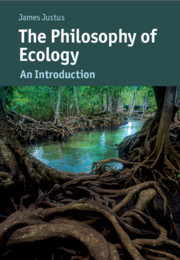Book contents
- The Philosophy of Ecology
- Cambridge Introductions to Philosophy and Biology
- The Philosophy of Ecology
- Copyright page
- Contents
- Figures
- Preface
- Introduction
- 1 The Ecological Niche
- 2 Distinctively Ecological Laws and the Reality of Biological Communities
- 3 The Balance of Nature
- 4 Modeling in Ecology
- 5 Biodiversity
- 6 Progress in Applied Ecology
- 7 Fact and Value in Applied Ecology
- References
- Index
2 - Distinctively Ecological Laws and the Reality of Biological Communities
Published online by Cambridge University Press: 28 May 2021
- The Philosophy of Ecology
- Cambridge Introductions to Philosophy and Biology
- The Philosophy of Ecology
- Copyright page
- Contents
- Figures
- Preface
- Introduction
- 1 The Ecological Niche
- 2 Distinctively Ecological Laws and the Reality of Biological Communities
- 3 The Balance of Nature
- 4 Modeling in Ecology
- 5 Biodiversity
- 6 Progress in Applied Ecology
- 7 Fact and Value in Applied Ecology
- References
- Index
Summary
This chapter connects philosophy of ecology with two central issues in philosophy of science: what marks the real, and the nature of laws of nature. On the former, biological communities are the problem case. Are they anything more than the individual organisms of different species comprising them? Answering requires evaluation of community structure and dynamics, species distribution patterns, and how interspecific groups might assemble into communities. Individualists, for example, argue species distributions along environmental gradients overlap continuously and significantly, do not form discrete boundaries, and that communities are only real if such distinct boundaries exist. On laws, various challenges confront the idea of distinctively ecological laws: the relative paucity of predictive success in ecology, that its models and experimental results lack sufficient generality, that candidate laws are riddled with exceptions, and that ecosystems are too complex. Some philosophers argue that other properties thought to preclude a discipline from trading in laws – limited predictive accuracy and generality, not being exceptionless – should be jettisoned. Ecology, they argue, has uncovered regularities – Gause’s law of competitive exclusion and numerous allometries – possessing a kind of necessity and therefore meriting the “natural law.” These arguments are found wanting.
Keywords
- Type
- Chapter
- Information
- The Philosophy of EcologyAn Introduction, pp. 38 - 57Publisher: Cambridge University PressPrint publication year: 2021

